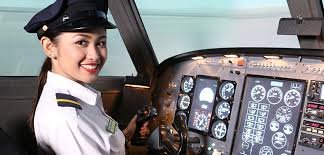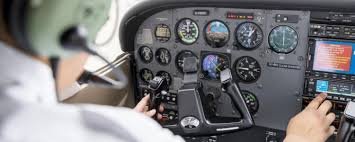Opportunities in Aviation Studies
Exploring the Vast Horizons of Aviation Education
In today’s fast-paced world, where globalization is the norm and connectivity is paramount, the aviation industry stands as a beacon of innovation and progress. As the world becomes increasingly interconnected, the demand for skilled aviation professionals continues to soar. Aviation studies offer a gateway to a world of limitless opportunities, where the sky is truly the limit.

Understanding the Importance of Aviation Studies
Aviation studies encompass a diverse range of disciplines, including pilot training, aeronautical engineering, air traffic management, aviation management, and aviation safety. These fields are critical for the smooth functioning of the aviation industry, ensuring safety, efficiency, and sustainability in air travel.
Embracing the Future of Aviation
As technology continues to advance at a rapid pace, the future of aviation holds endless possibilities. From electric aircraft and autonomous drones to supersonic travel and space tourism, the aviation industry is on the brink of revolutionary change. Those with a background in aviation studies will be at the forefront of these developments, shaping the future of air travel.
Career Opportunities in Aviation
One of the most compelling aspects of pursuing aviation studies is the wide array of career opportunities available. Whether you dream of flying high as a commercial pilot, designing the next generation of aircraft as an aerospace engineer, or managing airport operations as an aviation manager, the field of aviation offers something for everyone. Additionally, the global nature of the industry means that job opportunities exist around the world, providing international exposure and cultural enrichment.
The Path to Success in Aviation Studies
While the rewards of a career in aviation are plentiful, the path to success requires dedication, perseverance, and a commitment to continuous learning. Whether pursuing a degree in aviation from a prestigious university or undergoing specialized training at a certified flight school, aspiring aviation professionals must be willing to invest the time and effort required to excel in their chosen field.
Key Skills for Success in Aviation
To thrive in the competitive world of aviation, individuals must possess a unique blend of technical expertise, critical thinking skills, leadership abilities, and effective communication. Whether navigating complex flight routes, troubleshooting mechanical issues, or leading a team of aviation professionals, these skills are essential for success in the industry.
The Importance of Networking and Professional Development
In addition to academic qualifications and technical skills, networking and professional development play a crucial role in advancing one’s career in aviation. Attending industry conferences, joining professional associations, and seeking mentorship from experienced professionals can provide valuable insights and opportunities for career advancement.

The field of aviation studies offers a boundless realm of opportunities for those passionate about flight and aerospace technology. Whether your interests lie in piloting aircraft, engineering innovative designs, managing aviation operations, or delving into the intricate workings of air traffic control, there’s a pathway waiting to be explored.
For aspiring pilots, aviation studies provide a comprehensive understanding of flight principles, safety procedures, and navigation techniques. From mastering the controls of single-engine planes to navigating the complexities of commercial airliners, rigorous training programs equip pilots with the skills needed to take to the skies with confidence.
Meanwhile, for those fascinated by the mechanics of flight, aviation engineering programs delve deep into aerodynamics, propulsion systems, and aircraft design. Students learn to conceptualize, prototype, and refine aircraft structures, engines, and avionics, pushing the boundaries of innovation in the quest for safer, more efficient air travel.
Aviation studies also encompass the realm of aviation management, where students gain insight into the logistical, financial, and regulatory aspects of running airports, airlines, and aviation-related businesses. From optimizing flight schedules to ensuring compliance with industry regulations, aspiring aviation managers play a vital role in keeping the global air transportation network running smoothly.
Furthermore, the field of air traffic control offers a dynamic and high-stakes career path for those with a knack for multitasking and problem-solving. Aviation studies programs prepare future air traffic controllers to manage the flow of aircraft in busy airspace, making split-second decisions to ensure the safety and efficiency of every flight.
Beyond these traditional pathways, the rapid evolution of technology is opening up new frontiers in aviation studies. From the rise of unmanned aerial vehicles (UAVs) to the exploration of space tourism and beyond, the future of aviation holds limitless possibilities for those with the vision and determination to seize them.
Frequently Asked Questions (FAQ) :
1. What is aviation studies? Aviation studies encompass a broad range of academic and vocational disciplines related to the theory and practice of aviation. It includes fields such as piloting, aircraft engineering, aviation management, air traffic control, and more.
2. What are the career prospects in aviation studies? Career prospects in aviation studies are diverse and promising. Graduates can pursue careers as commercial pilots, aerospace engineers, aviation managers, air traffic controllers, aviation safety specialists, drone operators, and many more.
3. What qualifications are required to study aviation? The qualifications required to study aviation vary depending on the specific field and level of study. For entry-level positions, a high school diploma or equivalent is often sufficient, but many careers in aviation require additional education and training, such as a bachelor’s degree or specialized certifications.
4. How long does it take to become a pilot? The time it takes to become a pilot depends on the type of pilot license you aim to obtain and the training program you choose. Typically, it can take anywhere from several months to a few years to complete the necessary training and accumulate the flight hours required for various pilot licenses, such as a private pilot license (PPL) or a commercial pilot license (CPL).
5. What are the key skills needed for a career in aviation? Key skills for a career in aviation include strong problem-solving abilities, excellent communication skills, attention to detail, spatial awareness, decision-making under pressure, technical aptitude (especially for engineering and maintenance roles), and a commitment to safety.
6. Are there scholarships or financial aid available for aviation studies? Yes, there are scholarships, grants, and financial aid options available for students pursuing aviation studies. Many aviation organizations, government agencies, universities, and flight schools offer financial assistance to eligible students based on factors such as academic merit, financial need, and specific demographic criteria.
7. What are the current trends and challenges in the aviation industry? Current trends in the aviation industry include the adoption of sustainable aviation fuels, the development of electric and hybrid-electric aircraft, the expansion of drone technology and urban air mobility, and the increasing demand for air travel in emerging markets. Challenges facing the industry include regulatory complexities, environmental concerns, cybersecurity risks, and the need for skilled aviation professionals to meet growing demand.
8. Can I study aviation online? Yes, there are online programs available for studying various aspects of aviation, including aviation management, aviation safety, and aviation technology. However, certain components of aviation training, such as flight training for pilots, typically require in-person instruction and practical experience.
9. How do I choose the right aviation program or school? When choosing an aviation program or school, consider factors such as accreditation, reputation, facilities and resources, faculty expertise, industry connections, internship opportunities, job placement rates, and cost. It’s also important to assess whether the program aligns with your career goals and interests.
10. How can I stay updated on developments in the field of aviation studies? To stay updated on developments in aviation studies, you can follow industry publications, subscribe to aviation news websites and journals, join professional organizations related to aviation, attend conferences and workshops, and engage with online forums and communities dedicated to aviation enthusiasts and professionals.


